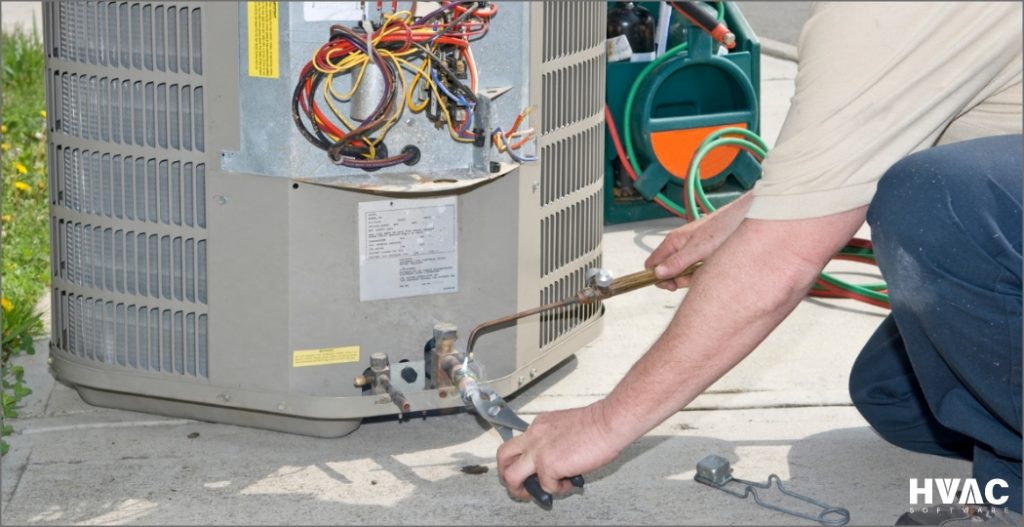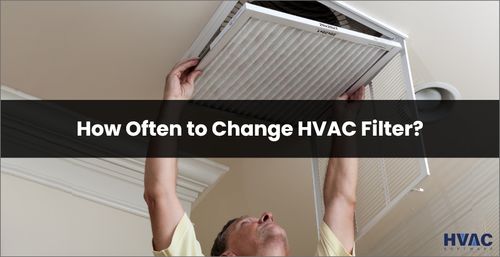HVAC filters are a very important aspect for any HVAC contractor. Filters for the heating, ventilation, and air-conditioning system (HVAC) are essential components of every comfortable home. They are crucial to the home’s comfort level and air quality.
They also serve to clean the air by filtering out allergens like dust, pollen, and pet hair. Airborne contaminants will be captured by an HVAC air filter, preventing them from being recirculated throughout a home’s interiors.
Procuring the right machine and changing the filters in due time is equally important. The life of a furnace or air conditioning unit is between 10-12 years. The frequency with which a filter needs to be changed depends on its quality and the size of the system.
Here are some tips on how often to change the HVAC air filter and how to pick the right one.
Contents
When is the Right Time to Change HVAC Filter?
How often you should change the HVAC filter? A dirty air filter should be replaced every 20–45 days on average. Extending that time frame beyond that point may be harmful.
As a contractor, you know that an HVAC system is a key part of your business. Ensuring that the customer’s systems keep running smoothly is essential to keeping them happy. But when is the right time to change an HVAC air filter?
The answer may vary depending on the type of system you are dealing with, but generally, it’s a good idea to change an HVAC air filter every few months. This will help to ensure that the HVAC efficiency is up to the mark and that your customers are comfortable.
If you notice that a system is not running as efficiently as it should be, or if customers notice an increase in their energy bills, it may be time to change their filter. A dirty air filter can cause the HVAC systems to work harder, which uses more energy and can end up costing more money.
Factors that determine the average lifespan
There are a few factors that determine the average lifespan of an HVAC air filter. The quality of the filter, the frequency of use, and the type of air conditioner all play a role in how long a filter will last.
- The quality of the filter is the most important factor in determining its lifespan. A high-quality filter will last longer than a low-quality filter.
- The frequency of use also plays a role in how long an air filter will last. A filter that is used more often will need to be replaced more often than one that is used less often.
- The type of air conditioner also affects how long a filter will last. A central air conditioner will have a different lifespan than a window unit.
- To ensure that your HVAC air filter lasts as long as possible, it is important to choose a high-quality filter and change it according to the air filter manufacturer's recommendations.
HVAC contractors play an important role in the installation and maintenance of heating, ventilation, and air conditioning systems.
- They are responsible for ensuring that these systems are installed properly and that they are functioning properly.
- They also perform routine maintenance and repairs on these systems.
- In addition, HVAC contractors may also provide other services such as duct cleaning and energy audits.
Why Should You Change the HVAC Filter?
An HVAC filter should be changed every few months to ensure that the air is clean and free of allergens. A dirty filter can cause the AC system to work harder and use more energy. It can also cause the furnace to overheat and break down.
It’s important to change your HVAC filter regularly for several reasons.
- To improve indoor air quality – Over time, these filters can become clogged with dust, pollen, and other airborne contaminants. This can cause the air in your home to become stale and polluted. By changing filters regularly, you can help ensure that the air in your customers’ homes is clean and fresh.
- To extend the life of an HVAC system – A clogged air filter can put a strain on the HVAC system, making it work harder than necessary to circulate air. This can also shorten the lifespan of the system.
- To save money on energy costs – When an HVAC equipment has to work harder than necessary, it uses more energy, driving up your utility bills. Changing air filters regularly can help keep energy bills low.
The following are some of the most compelling arguments in favor of routinely replacing an air filter.
Hypersensitivity and asthma

When an air filter gets dirty, it can harm people who are allergic to dust or who suffer from respiratory disorders like asthma or chronic obstructive pulmonary disease. Unfortunately, this can sometimes cause serious health problems, such as asthma attacks.
A dirty air filter should be replaced every 20–45 days on average. Extending that time frame beyond that point may be harmful.
Pets
Many families have both humans and animals as permanent residents. Filters in homes with even a single pet can quickly become clogged with the hair and other particles that animals shed.
Filter traps, air filters, furnace filters, and so on should all be swapped out at least once every 60 days.
Estate dimensions
A home’s air quality is proportional to how often an air filter needs to be changed. Generally speaking, the volume of air pumped by a heating and cooling system, such as a furnace filter, will be less in a smaller home to achieve the same degree of temperature change as in a larger home.
As a result, the frequency with which the filters in residences of varying sizes need to be changed is inversely proportional. Not always rely on this reasoning, though; it’s still important to check in frequently to determine if they need to be replaced.
Application of heating, ventilating, and air conditioners
Furthermore, it stands to reason that the more frequently an HVAC unit is run, the quicker its filters will become clogged. To a greater extent, it will trap particles the more times it is cycled. Therefore, at these peak times, filter usage will cause them to soon become saturated.
As the seasons change from winter to summer, the frequency of usage of HVAC filters increases remarkably in order to remove the increased quantity of allergens and airborne particles. However, you’ll notice an increase in heating use (furnace filters) when summer gives way to winter.
Indoor and outdoor air quality
There are many benefits to changing HVAC filters regularly. One of the most important is that it can improve the quality of both indoor and outdoor air. Filters help to remove contaminants from the air, which can improve health and the environment.
The air filter in a furnace and the one in an air conditioner will have a shorter lifespan and need replacing more frequently if the air quality outside and in a home is poor. Low-quality air filters require more regular cleaning and replacement.
How to Change HVAC Filter?
If the heating, ventilation, and cooling system in your client’s home or office is not working properly, it might be time to change the air filter. A clogged filter can cause the system to work harder than it needs to, which can lead to increased energy costs and decreased efficiency.
Changing the HVAC filter is a simple task that can be done in just a few minutes. First, locate the filter housing unit, which is typically located near the return air duct, air handler, or blower unit. Once you have located the unit, remove the old filter and insert the new filter.
Make sure the new filter is positioned correctly, and then close the housing unit. With the new filter in place, your HVAC system should be able to operate more effectively. Here is how to change an air filter when it’s time for a replacement.
1. Turn off the system
The first thing you need to do is turn off the heating and air conditioning system. During the time that you are removing and replacing a filter, you do not want the air to be moving.
2. Locate the filters
The second stage entails locating the filter. Find it in the guidebook. AC filters can be found in a few different locations. If your HVAC system is housed in a cabinet, the filter may be concealed behind the grille of the extra-large return-air register on the wall.
The compact, 1″ filter rack is typical for up-flow or horizontal systems found in the basement or attic. This filter is normally located outside the furnace, between the furnace’s wall and the air distribution box, and is accessible by a removable door (also known as the plenum box).
3. Remove the screws

Third, take out the screws. A filter will be under a cover that needs to be unscrewed. Don’t lose the screws by hiding their location.
Before you change the HVAC air filter, remove the cover if you have one and give it a good cleaning. Remove it with dust, a vacuum, or water. Remove all dust and dirt from every nook and cranny.
4. Remove the dirty filters
In the fourth step, the soiled HVAC air filter is discarded. If you need to change an air filter, remember to bring a huge garbage bag. A dirty HVAC air filter is the last thing you want the customers to lug around their homes.
If a system has a filter that can be cleaned, you can take it outdoors and rinse it off with water by placing it in a garbage bag.
5. Replace if required
Fifth, make sure the new filter’s arrows are set correctly. Verify that you are inserting the filter properly. If the filter is installed in the wrong orientation, it will not prevent dust and other particles from entering the ventilation system.
Take a look at the arrows on the filter; they will show you which way to rotate the filter. You should record the date you set up the filter if there is a space for doing so on it. The filter is then inserted into its slot, and the lid is secured with the appropriate screws.
Frequently Asked Questions
These are the frequently asked questions that the clients usually ask their HVAC contractors.
What is the average lifespan of an HVAC filter?
The average lifespan of an HVAC air filter especially if you are using g less expensive fiberglass filters, is about 30 days. However, pleated air filters are high-quality filters that are very effective in trapping particles and last up to 90 days. Also, it is important to note that a customer has to undergo frequent air filter replacement in case they have pets at home or live in a dusty area. A dirty HVAC filter can cause the system to work harder and can lead to expensive repairs.
What is the average cost of replacing the HVAC filters?
The average cost of changing an HVAC air filter is about $20. However, the benefits of changing a filter are much greater than the cost. If a customer has allergies, asthma, or other respiratory problems, changing their HVAC filter can greatly improve their symptoms.
What will happen if I forget to replace the filters?
If the HVAC air filter replacement is skipped due to varied reasons that may include customers not changing their filters or forgetting to replace them, their system will have to work harder to circulate air. This means that the energy bill will be higher, and the HVAC system will be more likely to break down.
In addition, not changing the filter can lead to poor air quality, as dust and other airborne particles will build up in the system.
What are the benefits of using HVAC air filters?
Most people don’t think about their air filters, but they play a crucial role in keeping homes safe and clean.
- Air filters trap dust, pollen, and other airborne particles that could cause respiratory problems.
- They also help to prevent fires by trapping lint and other flammable materials.
Conclusion
Routinely changing an air filter is important for maintaining a healthy and efficient system. Depending on the type of filter the customers have, it should be changed every 1-3 months.
With regular maintenance, you can help customers extend the life of their HVAC systems and keep them running smoothly all year long. With hvacsoftware.com, you can get Reviews, Trends, and Insights and make an informed decision about your client’s HVAC needs.

